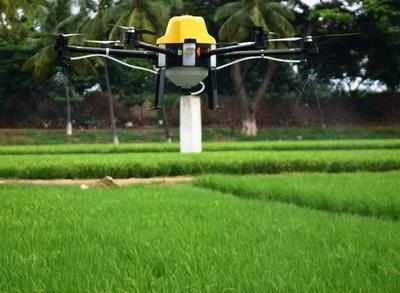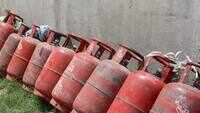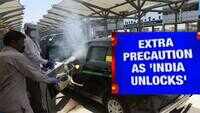
Mysuru:Mangaluru: As vast swathes of crops were destroyed by swarms of locusts in western, Central India and neighbouring Maharashtra and Tamil Nadu, state government has asked all joint directors of agriculture to be prepared to tackle possible locust attacks on crops in Karnataka.
Sources in the department of agriculture told TOI that the state agriculture department had conducted a video conference of joint directors of agriculture of all the districts last week and advised the district agricultural officers to prepare and be ready with their plan to prevent the probable attack on standing crops.
The Central government has also issued advisory to the state governments to conduct awareness programmes for the public/farmers to prevent and control the possible attack.
TOI had highlighted on Monday about the presence of locust swarms in Noojibalthila, Renjiladi, Shirlalu in Dakshina Kannada district.
Agriculture department joint director MC Seetha had clarified that swarms of locusts found in Dakshina Kannada villages are not desert locusts. Meanwhile, officials in Puttur taluk clarified that the insect found in villages is ‘spotted coffee grasshopper.’
Speaking to TOI, joint director of agriculture Mahantheshappa said: “Though locust attack is less likely in the district, the department has chalked out a plan to prevent it. Mysuru district has 3.71 lakh hectares of cultivable land. Of this, 2.50 lakh hectares of land is rain-fed and rest is irrigated where a large number of farmers grow paddy, sugar cane and other crops. Farmers have sown pulses, jowar, ragi, oilseeds, cotton, tobacco in rain-fed land following good spell of pre-monsoon showers during this kharif season.”
The department has taken extensive preventive measures for protection of standing commercial crops like VFC tobacco (Virginia flue cured tobacco) cultivated by a large number of farmers in Hunsur, Periyaptana, and H D Kote covering around 25,000 hectares of land; cotton, produced in Nanjangud, pulses and oil seeds in Hunsur and T Narasipura taluks, the official added.
“Apart from advising farmers to spray neem, the department is also planning to use drones for aerial spraying of insecticides”, he added.
Sources in the department of agriculture told TOI that the state agriculture department had conducted a video conference of joint directors of agriculture of all the districts last week and advised the district agricultural officers to prepare and be ready with their plan to prevent the probable attack on standing crops.
The Central government has also issued advisory to the state governments to conduct awareness programmes for the public/farmers to prevent and control the possible attack.
TOI had highlighted on Monday about the presence of locust swarms in Noojibalthila, Renjiladi, Shirlalu in Dakshina Kannada district.
Agriculture department joint director MC Seetha had clarified that swarms of locusts found in Dakshina Kannada villages are not desert locusts. Meanwhile, officials in Puttur taluk clarified that the insect found in villages is ‘spotted coffee grasshopper.’
Speaking to TOI, joint director of agriculture Mahantheshappa said: “Though locust attack is less likely in the district, the department has chalked out a plan to prevent it. Mysuru district has 3.71 lakh hectares of cultivable land. Of this, 2.50 lakh hectares of land is rain-fed and rest is irrigated where a large number of farmers grow paddy, sugar cane and other crops. Farmers have sown pulses, jowar, ragi, oilseeds, cotton, tobacco in rain-fed land following good spell of pre-monsoon showers during this kharif season.”
The department has taken extensive preventive measures for protection of standing commercial crops like VFC tobacco (Virginia flue cured tobacco) cultivated by a large number of farmers in Hunsur, Periyaptana, and H D Kote covering around 25,000 hectares of land; cotton, produced in Nanjangud, pulses and oil seeds in Hunsur and T Narasipura taluks, the official added.
“Apart from advising farmers to spray neem, the department is also planning to use drones for aerial spraying of insecticides”, he added.

Coronavirus outbreak
Trending Topics
LATEST VIDEOS
City
 Watch: Video proof of Pak diplomat spying with a decoy sent by the Indian Intelligence Agency
Watch: Video proof of Pak diplomat spying with a decoy sent by the Indian Intelligence Agency  Unlock 1.0: Non-subsidized LPG gas price hiked by Rs 11.50 in Delhi
Unlock 1.0: Non-subsidized LPG gas price hiked by Rs 11.50 in Delhi  Covid-19 crisis and lockdown: Delhi CM Arvind Kejriwal seeks public suggestions
Covid-19 crisis and lockdown: Delhi CM Arvind Kejriwal seeks public suggestions  India unlocks: Guidelines issued to taxi services operating to and from Delhi Airport
India unlocks: Guidelines issued to taxi services operating to and from Delhi Airport
More from TOI
Navbharat Times
Featured Today in Travel
Quick Links
Kerala Coronavirus Helpline NumberHaryana Coronavirus Helpline NumberUP Coronavirus Helpline NumberBareilly NewsBhopal NewsCoronavirus in DelhiCoronavirus in HyderabadCoronavirus in IndiaCoronavirus symptomsCoronavirusRajasthan Coronavirus Helpline NumberAditya ThackerayShiv SenaFire in MumbaiAP Coronavirus Helpline NumberArvind KejriwalJammu Kashmir Coronavirus Helpline NumberSrinagar encounter
Get the app



